Best Substitutes For Coconut Oil In Baking
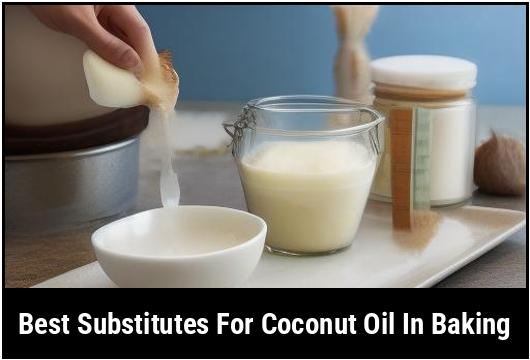
Coconut oil has been a popular ingredient in baking for its unique flavor and texture. However, due to dietary restrictions, personal preferences, or simply running out of coconut oil, you may find yourself in need of a substitute. Fortunately, there are several options available that can mimic the characteristics of coconut oil and produce equally delicious results. In this article, we will explore the best substitutes for coconut oil in baking and provide useful tips on how to use them effectively.
Key Takeaways
- Coconut oil is a commonly used ingredient in baking due to its distinct flavor and texture.
- In case you need a substitute for coconut oil, several options are available that can mimic its characteristics.
- Some of the best substitutes for coconut oil in baking include butter, olive oil, vegetable oil, and applesauce.
- Each substitute has its own unique properties, so consider the recipe and desired outcome when choosing a substitute.
- Adjusting the amount of substitute used may be necessary to achieve the desired texture and flavor in your baked goods.
Why You Need A Substitute For Coconut Oil In Baking
There are several reasons why you might need a substitute for coconut oil in baking. Some individuals have dietary restrictions that prevent them from consuming coconut oil, such as allergies or sensitivities. Others may simply not enjoy the flavor of coconut or want to experiment with different flavors in their baked goods. Lastly, it’s possible that you’ve run out of coconut oil and need to find a suitable replacement to continue with your baking project. Whatever the reason, having alternative options will ensure that you can still create delicious and flavorful baked goods.
Types Of Substitutes For Coconut Oil In Baking
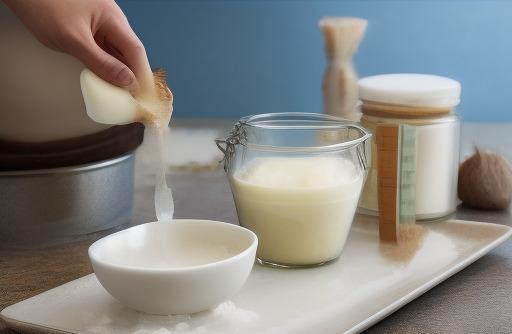
When looking for a substitute for coconut oil in baking, it’s important to consider the desired outcome of your recipe. Coconut oil is commonly used for its flavor, texture, and ability to add moisture to baked goods. Below are some of the best substitutes that can mimic these characteristics:
-
Butter: Butter is a versatile substitute for coconut oil in baking. It adds richness, flavor, and moisture to your baked goods. When using butter as a substitute, make sure to use unsalted butter to avoid altering the overall taste of the recipe. Consider using a 1:1 ratio of butter to coconut oil, but keep in mind that butter contains more water content, so you may need to adjust the recipe slightly.
-
Olive oil: Olive oil is a healthy and flavorful substitute for coconut oil in baking. Extra virgin olive oil is preferred for its robust flavor, but you can also use regular olive oil if you prefer a milder taste. Use a 3/4 cup of olive oil for every 1 cup of coconut oil called for in the recipe. Olive oil adds moisture and richness to your baked goods, but it may also impart a slight olive oil taste, so take that into consideration when choosing your recipes.
-
Vegetable oil: Vegetable oil is a neutral-flavored substitute for coconut oil that works well in most baking recipes. It is easily accessible and affordable. Substitute vegetable oil in a 1:1 ratio for coconut oil. Keep in mind that vegetable oil has a higher smoke point than coconut oil, so it may affect the browning and texture of certain baked goods.
-
Applesauce: Applesauce is a healthy and low-fat substitute for coconut oil in baking. It adds moisture and helps bind the ingredients together. Replace coconut oil with an equal amount of applesauce in recipes. The applesauce will make the final product slightly denser and have a subtle apple flavor. It works particularly well in recipes like muffins, cakes, and quick breads.
These are just a few examples of substitutes for coconut oil in baking. Each substitute has its own unique characteristics, so it’s important to choose the one that best fits your recipe and personal preferences.
Pro Tip: When substituting coconut oil with butter, make sure to use a slightly lesser amount of butter as it contains more moisture. For example, if the recipe calls for 1 cup of coconut oil, use about 3/4 cup of butter. Adjust as needed based on the desired texture and flavor of your baked goods.
Best Substitutes For Coconut Oil In Baking
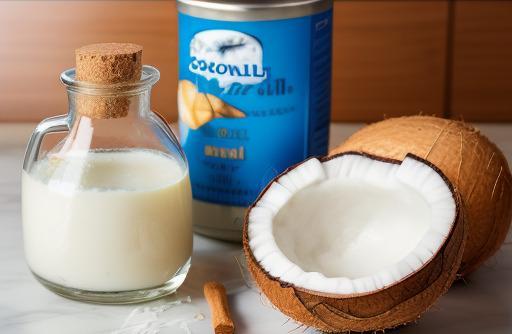
-
Butter: Butter is a versatile substitute for coconut oil in baking. It adds richness, flavor, and moisture to your baked goods. When using butter as a substitute, make sure to use unsalted butter to avoid altering the overall taste of the recipe. Consider using a 1:1 ratio of butter to coconut oil, but keep in mind that butter contains more water content, so you may need to adjust the recipe slightly.
-
Olive oil: Olive oil is a healthy and flavorful substitute for coconut oil in baking. Extra virgin olive oil is preferred for its robust flavor, but you can also use regular olive oil if you prefer a milder taste. Use a 3/4 cup of olive oil for every 1 cup of coconut oil called for in the recipe. Olive oil adds moisture and richness to your baked goods, but it may also impart a slight olive oil taste, so take that into consideration when choosing your recipes.
-
Vegetable oil: Vegetable oil is a neutral-flavored substitute for coconut oil that works well in most baking recipes. It is easily accessible and affordable. Substitute vegetable oil in a 1:1 ratio for coconut oil. Keep in mind that vegetable oil has a higher smoke point than coconut oil, so it may affect the browning and texture of certain baked goods.
-
Applesauce: Applesauce is a healthy and low-fat substitute for coconut oil in baking. It adds moisture and helps bind the ingredients together. Replace coconut oil with an equal amount of applesauce in recipes. The applesauce will make the final product slightly denser and have a subtle apple flavor. It works particularly well in recipes like muffins, cakes, and quick breads.
These substitutes for coconut oil can be used in a wide range of baking recipes, including cakes, cookies, breads, and muffins. Experiment with each substitute to find the one that best suits your taste preferences and desired outcome.
Choosing The Right Substitute For Coconut Oil In Baking
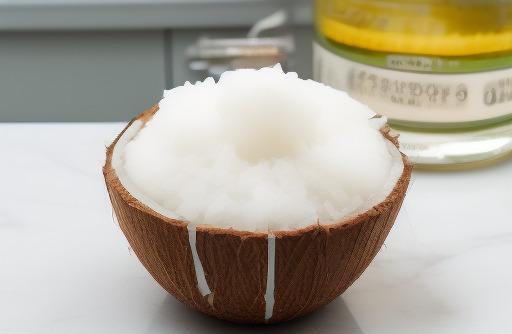
Choosing the right substitute for coconut oil in baking depends on the recipe and the desired outcome. Consider the following factors when selecting the substitute:
-
Flavor: Coconut oil has a unique flavor that adds a tropical twist to baked goods. If you want to maintain the coconut flavor, consider using other ingredients that have a similar taste, such as butter or virgin coconut oil. If you prefer to experiment with different flavors, olive oil or vegetable oil can be excellent alternatives.
-
Texture: Coconut oil adds moisture and richness to baked goods. If you want to maintain the same level of moisture, use butter or olive oil as substitutes. Applesauce can also add moisture, but it may result in a denser texture in some recipes.
-
Health considerations: If you are looking for healthier alternatives, olive oil and applesauce are great options. Olive oil contains heart-healthy fats, while applesauce is low in fat and calories.
Consider these factors and the specific requirements of your recipe to choose the best substitute for coconut oil in baking.
Cooking With Substitutes For Coconut Oil In Baking
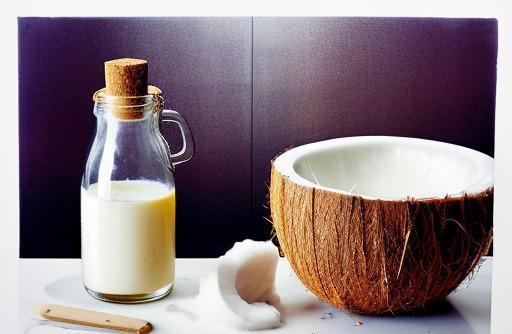
When cooking with substitutes for coconut oil in baking, it’s essential to adjust the amount used to achieve the desired texture and flavor. Here are some tips to help you successfully cook with substitutes:
-
Butter: If using butter as a substitute, soften it before incorporating it into the recipe. Cream the butter with the other ingredients, just as you would with coconut oil. You may need to decrease the overall amount slightly due to the higher water content in butter, as mentioned earlier.
-
Olive oil: When using olive oil as a substitute, be mindful of its flavor. Extra virgin olive oil has a more pronounced flavor compared to regular olive oil, which is more mild. Consider using extra virgin olive oil for recipes that could benefit from its distinct taste, such as chocolate cake or banana bread. For recipes that require a milder flavor, regular olive oil can be used.
-
Vegetable oil: Substitute vegetable oil for coconut oil in a 1:1 ratio. Remember that vegetable oil has a higher smoke point, so it may affect the browning and texture of certain baked goods. Use it in recipes that do not rely heavily on the coconut flavor and where the vegetable oil’s neutral taste will work well.
-
Applesauce: Replace coconut oil with an equal amount of applesauce in recipes. Since applesauce adds moisture, you may need to adjust the other liquid ingredients in the recipe slightly. Applesauce works particularly well in recipes that can benefit from its subtle apple flavor, such as muffins and cakes.
Always follow the recipe instructions and make adjustments as needed when using substitutes for coconut oil in baking. Keep in mind that the final result may vary slightly from the original recipe when using substitutes, but with practice, you will be able to achieve excellent results.
Recipes Using Substitutes For Coconut Oil In Baking
Now that you are familiar with the substitutes for coconut oil in baking, here are a few delicious recipes where you can try them out:
-
Chocolate Chip Cookies with Olive Oil:
- Ingredients:
- 3/4 cup olive oil
- 1 cup brown sugar
- 1/2 cup granulated sugar
- 2 large eggs
- 2 teaspoons vanilla extract
- 2 1/4 cups all-purpose flour
- 1 teaspoon baking soda
- 1/2 teaspoon salt
- 2 cups chocolate chips
- Instructions:
- Preheat the oven to 350°F (175°C) and line a baking sheet with parchment paper.
- In a large bowl, whisk together olive oil, brown sugar, and granulated sugar until well combined.
- Add the eggs and vanilla extract and mix until smooth.
- In a separate bowl, sift together the flour, baking soda, and salt.
- Gradually add the dry ingredients to the wet ingredients, mixing until just combined.
- Fold in the chocolate chips.
- Drop rounded tablespoons of dough onto the prepared baking sheet, spacing them about 2 inches apart.
- Bake for 10-12 minutes or until golden brown around the edges.
- Let the cookies cool on the baking sheet for a few minutes, then transfer them to a wire rack to cool completely.
- Ingredients:
-
Applesauce Banana Bread:
- Ingredients:
- 1 1/2 cups all-purpose flour
- 1 teaspoon baking soda
- 1/4 teaspoon salt
- 1/2 teaspoon ground cinnamon
- 1/4 cup unsalted butter, softened
- 1/2 cup granulated sugar
- 1/2 cup unsweetened applesauce
- 2 large ripe bananas, mashed
- 2 large eggs
- 1 teaspoon vanilla extract
- Instructions:
- Preheat the oven to 350°F (175°C) and grease a 9×5-inch loaf pan.
- In a medium bowl, whisk together the flour, baking soda, salt, and cinnamon.
- In a large bowl, cream together the softened butter and granulated sugar until light and fluffy.
- Add the applesauce, mashed bananas, eggs, and vanilla extract to the butter mixture. Mix until well combined.
- Gradually add the dry ingredients to the wet ingredients, mixing until just combined.
- Pour the batter into the prepared loaf pan and spread evenly.
- Bake for 50-60 minutes, or until a toothpick inserted into the center comes out clean.
- Allow the bread to cool in the pan for 10 minutes, then transfer it to a wire rack to cool completely before slicing.
- Ingredients:
These recipes showcase the versatility of substitutes for coconut oil in baking. Feel free to experiment with different substitutes and adjust the ingredients to suit your taste preferences.
Storage And Shelf Life Of Substitutes
The storage and shelf life of substitutes for coconut oil in baking vary depending on the substitute used. Here are some general guidelines:
-
Butter: Store butter in an airtight container in the refrigerator. It can last for several weeks when properly stored.
-
Olive oil: Extra virgin olive oil should be stored in a cool, dark place, away from direct light and heat. It can last for up to two years when properly stored. Regular olive oil can last for about a year.
-
Vegetable oil: Vegetable oil has a longer shelf life compared to other substitutes. Store it in a cool, dark place, away from direct light and heat. It can last for up to two years when properly stored.
-
Applesauce: Store applesauce in the refrigerator in a sealed container. It can last for up to one week. If you are using a store-bought applesauce, check for the expiration date on the packaging.
Always check the expiration dates on the packaging and use your judgment to determine if the substitute is still suitable for use. If the substitute has a rancid smell or taste, it’s best to discard it and use a fresh batch.
Conclusion
While coconut oil is a popular ingredient in baking, there are several substitutes available that can mimic its unique flavor, texture, and moisture content. Butter, olive oil, vegetable oil, and applesauce are some of the best substitutes for coconut oil in baking. Remember to consider the flavor and texture requirements of your recipe when choosing a substitute, and adjust the amounts accordingly. With the right substitute and some experimentation, you can continue to create delicious and flavorful baked goods even without coconut oil. Happy baking!
FAQS
What Are Some Good Substitutes For Coconut Oil In Baking?
There are several options for replacing coconut oil in baking. One popular choice is butter, which has a similar consistency and flavor to coconut oil. Other substitutes include vegetable oil, canola oil, olive oil, and avocado oil.
Is It Possible To Use Applesauce As A Substitute For Coconut Oil In Baking?
Yes, applesauce can be used as a substitute for coconut oil in some recipes. It can add moisture to baked goods and has a mild, sweet flavor. However, it may not work well in recipes that specifically call for coconut oil for its distinct flavor or texture.
Can I Use Margarine Instead Of Coconut Oil In Baking?
Yes, margarine can be used as a substitute for coconut oil in baking. However, it is important to choose a margarine that is specifically formulated for baking. Some margarines may contain water or other ingredients that can affect the texture or flavor of baked goods.
What Are The Benefits Of Using Avocado Oil As A Substitute For Coconut Oil In Baking?
Avocado oil is a good substitute for coconut oil in baking because it has a mild flavor and a high smoke point. This means that it can be heated to high temperatures without breaking down and releasing harmful compounds. Avocado oil also contains healthy fats and antioxidants, which can benefit overall health.
How Do I Determine How Much Of A Substitute Oil To Use In Place Of Coconut Oil In A Recipe?
The amount of substitute oil you need will depend on the recipe and the specific oil you choose. As a general rule, you can use a 1:1 ratio of substitute oil to coconut oil. However, you may need to adjust the amount slightly depending on how the recipe turns out. It may be helpful to consult a baking guide or recipe book for more specific guidelines.
Sources
About the Author Jenny
I'm Jenny, a housewife with an unwavering passion for food. My culinary journey began with my grandmother's kitchen, and it's now a full-fledged food blog. I've turned my love for cooking into a creative outlet, sharing recipes and stories with a global community of fellow food enthusiasts. It's proof that being a housewife can also mean pursuing your passions and savoring life's delectable moments.
